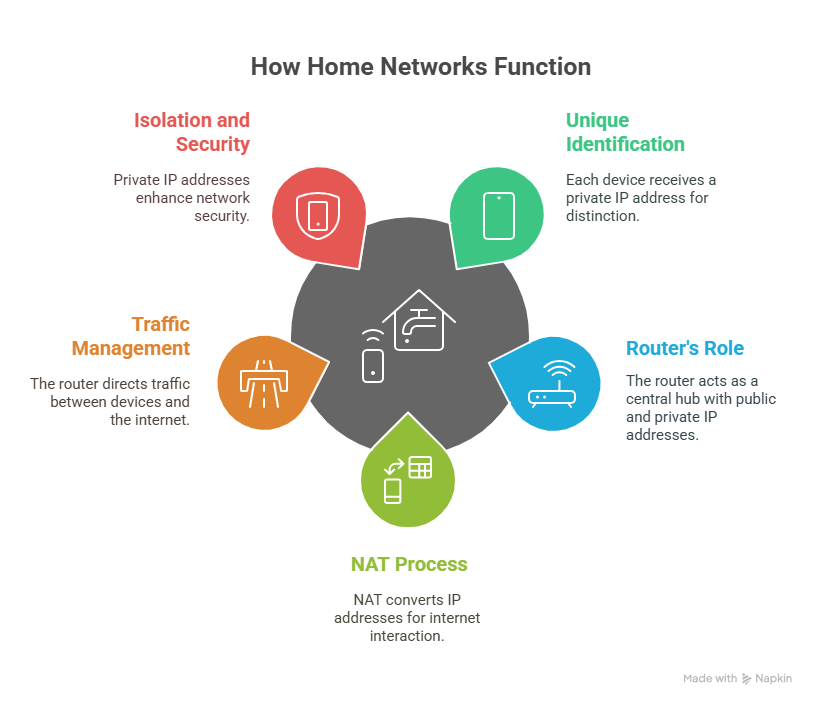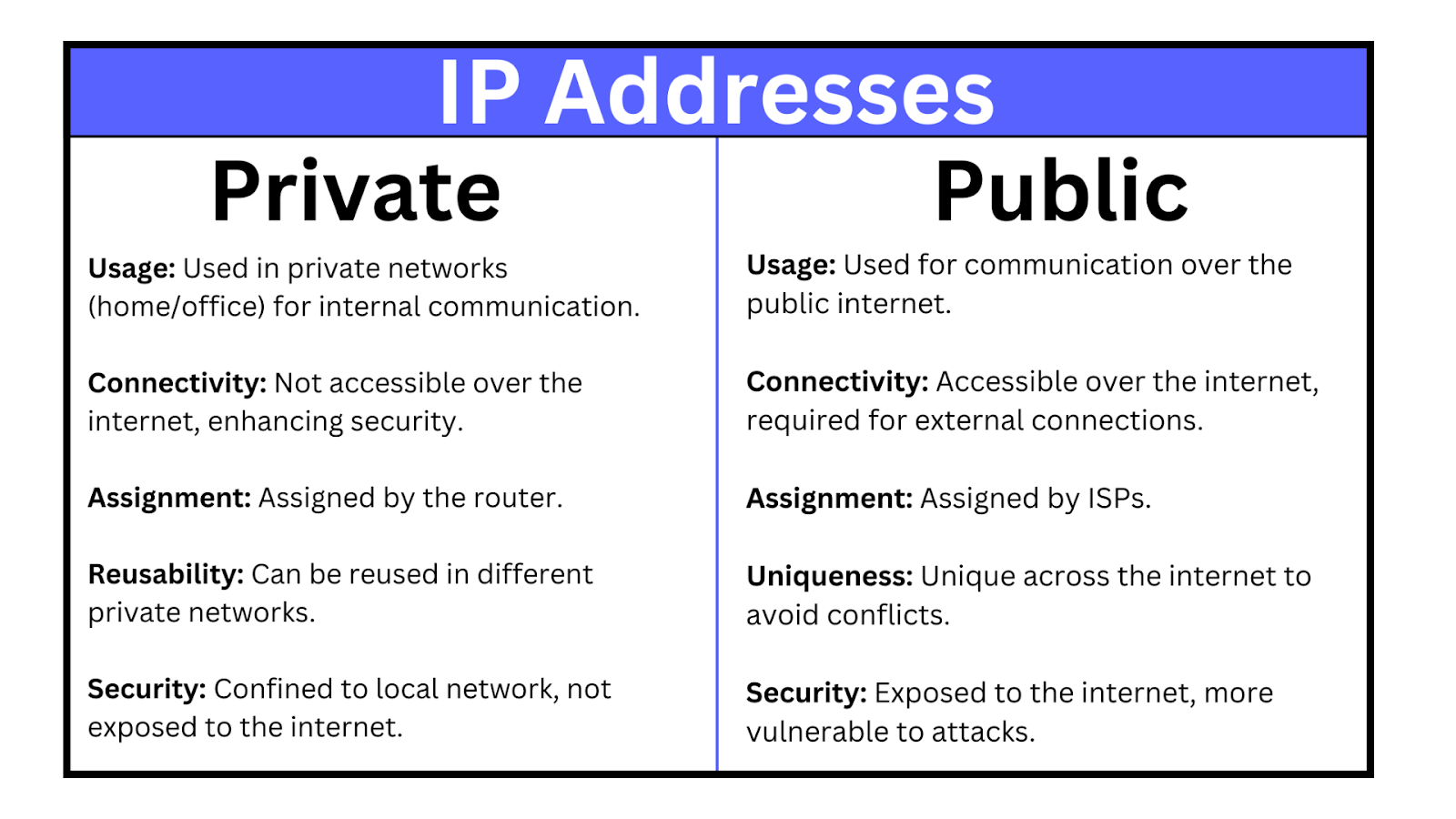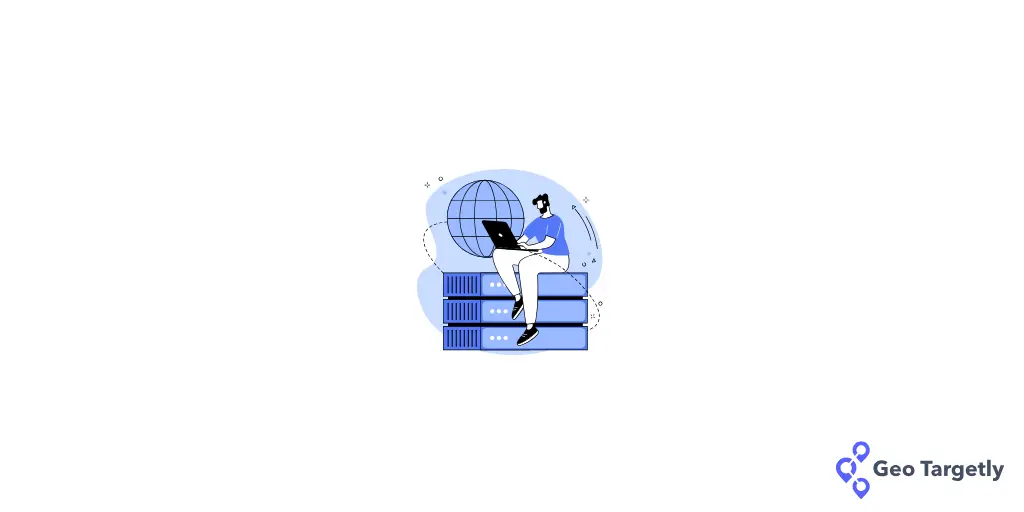

A private IP address is used inside your local network to let devices communicate securely without being exposed to the public internet. Your router assigns private IPs and uses NAT to connect those devices through a single public IP. This setup improves security, supports network organization, and allows homes, offices, and cloud systems to run efficiently while keeping internal traffic private.
Key takeaways:
- Private IP addresses work only inside local networks, they are not visible or reachable from the public internet.
- Routers assign private IPs and use NAT to translate them into one public IP for internet access.
- They improve security by hiding internal devices, reducing exposure to external scans and attacks.
- Private IPs enable network segmentation, such as separating guest Wi-Fi from internal business systems.
- There are defined private IP ranges for IPv4 and IPv6, including 10.x.x.x, 172.16–31.x.x, and 192.168.x.x.
- They are widely used in homes, offices, cloud environments, IoT systems, and campuses to manage internal communication.
- Private IPs are a foundation, not a full security solution, and should be combined with firewalls and good access controls.
- Understanding private vs public IPs helps you design safer and more efficient networks and troubleshoot connectivity issues faster.
A private IP address is a unique number assigned to a device within your local network. It’s what lets your laptop, phone, printer, and other gadgets talk to each other without ever going through the open internet.
Your router gives out these private IPs behind the scenes. Then, using NAT (Network Address Translation), it translates those private addresses into a single public IP address for the internet.
This setup keeps internal devices secure and lets multiple devices share one internet connection.
Private vs public IP: What’s the difference?
In short, private IPs keep things local and secure, while public IPs handle communication with the outside world.
Tip: Are you trying to gather information on your website visitors? Check out our guide on how to find someone’s IP address.
How does a private IP address work?
Private IP addresses ensure that each device on a network can send and receive information correctly. Here’s a breakdown of how private IP addresses function:
- Unique identification: Every device in a network, such as your home network, receives a private IP address from the router. This unique identifier allows the router to distinguish between different devices.
- Role of the router: Your router is the central hub of your home network. When a device, like your computer or smartphone, connects to the router, it receives a private IP address. The router itself is assigned a public IP address by your Internet Service Provider (ISP), which is used for communication with the wider internet.
- Network Address Translation (NAT): This is a key process that allows private IP addresses to interact with the internet. NAT converts the private IP addresses to the router’s public IP address for outgoing traffic. When the response returns, NAT translates the public IP address back to the appropriate private IP address and directs the data to the correct device.
- Traffic management: When you request a webpage, your device sends the request to the router, which then forwards it to the internet using the public IP address. The server's response is sent back to the router, which then uses NAT to direct the information to the requesting device using its private IP address.
- Isolation and security: Private IP addresses are not visible on the internet, providing a layer of security. Devices within your network can communicate with each other directly using their private IP addresses, but external devices cannot initiate communication with these internal addresses.
This system allows multiple devices to share a single public IP address while maintaining unique private IP addresses for internal communication. It also offers efficient data routing and provides security by hiding the internal network structure from external entities.

How Private IP addresses improve network security
One of the biggest perks of private IP addresses is that they keep your devices tucked safely behind the scenes. Here's how they help protect your network:
They reduce your exposure
Devices using private IPs aren’t directly reachable from the public internet. That means hackers can’t easily scan or target them from the outside – your laptop, printer, or smart fridge stays invisible unless you invite access through specific settings or ports.
They support network segmentation
Private IPs let you break your network into smaller, isolated chunks. For example, you can keep your guest Wi-Fi on a separate subnet from your company’s internal systems.
If something goes wrong in one area (like malware or a rogue device), it won’t spread across the whole network.
They work well with firewalls and NAT
Most routers come with built-in firewalls that block unsolicited traffic to private IPs by default. Combined with NAT, your internal network stays behind a single public-facing IP, which adds another barrier against external attacks.
They help control internal traffic
Since you’re assigning and managing IPs locally, you can set rules about what devices are allowed to do, like restricting IoT (Internet of Things) devices from accessing sensitive systems or limiting bandwidth to certain users.
Private IPs don’t replace other security tools, but they do lay a solid foundation of protection. Keeping your internal traffic internal lowers the chances of something slipping in unnoticed.
What are the different types of private IP address ranges?
Private IP addresses are used within local networks to facilitate communication between devices without exposing them to the internet. These addresses fall into specific ranges for both IPv4 and IPv6 protocols.
IPv4 private address ranges
IPv4 private addresses are categorized into three main classes, each designed for different network sizes:
- Class A IP Addresses: Used by large organizations or ISPs with thousands of devices.
- Range: 10.0.0.0 to 10.255.255.255
- Usage: Suitable for large networks
- Configuration: 8 bits for the network portion and 24 bits for host addresses
- Class B IP Addresses: Common in medium-sized enterprise networks.
- Range: 172.16.0.0 to 172.31.255.255
- Usage: Ideal for medium-sized networks
- Configuration: 16 bits for the network portion and 16 bits for host addresses
- Class C IP Addresses: Perfect for home networks or small offices.
- Range: 192.168.0.0 to 192.168.255.255
- Usage: Best for smaller networks
- Configuration: 24 bits for the network portion and 8 bits for host addresses
These ranges are designed to be reused across different private networks without causing conflicts, unlike public IP addresses that must be globally unique.
IPv6 private address ranges
IPv6 introduces a more expansive addressing system, including specific ranges for private networks:
- fc00::/7: This block is reserved for unique local addresses (ULAs) by the Internet Assigned Numbers Authority (IANA). These addresses are used within a site or between a limited number of sites.
- fec0::/10: Originally designated for site-local addresses, this range is now deprecated in favor of ULAs.
IPv6 addresses are written in hexadecimal format, consisting of 32 characters grouped into eight blocks, making them significantly longer than IPv4 addresses.
Use cases for private IP addresses
Private IP addresses keep internal networks humming, whether it’s your apartment or a sprawling data center. These are some everyday scenarios where they play a starring role:
- Home networking: Your router assigns private IPs to every device connected to your Wi-Fi. That means your phone can stream to your smart TV, your printer can talk to your laptop, and none of it touches the public internet. It’s safe and self-contained.
- Office setups: Picture a mid-sized company with 100 employees. Each computer, VoIP phone, and shared printer gets a private IP. It helps the IT team keep everything organized behind a firewall, and lets devices interact securely within the local network.
- Cloud infrastructure: In platforms like AWS, Google Cloud, or Azure, services inside a Virtual Private Cloud (VPC) like a database, app server, or internal dashboard, all use private IPs to talk to each other without going public. It’s faster, cheaper, and more secure.
- IoT and smart environments: Think smart factories or even your local Amazon warehouse. Sensors, conveyor belts, and robotic arms often communicate via private IPs all managed by internal servers to minimize external exposure and latency.
- Schools and campuses: Universities often use subnetting to assign blocks of private IPs to each dorm or building. That way, the IT department can control bandwidth, isolate systems, and ensure student devices aren’t interfering with admin tools.
How do you check your private IP address?
Knowing your private IP address can be useful in various scenarios, such as troubleshooting network issues or setting up a device. If you're wondering, "What is my IP?", it typically refers to your public IP address, which is assigned by your Internet Service Provider (ISP) and identifies your device on the internet. Your private IP address, on the other hand, is used within your local network.
Here’s how you can find it across different platforms:
- Windows:
- Search for "cmd" in the Windows search bar to open the Command Prompt.
- Type ipconfig and press Enter.
- Look for the IP address under the relevant network connection.
- Mac:
- Open "System Preferences."
- Select "Network."
- Choose the network connection and view the IP address displayed.
- iPhone:
- Open "Settings."
- Go to "Wi-Fi" and tap the “i” next to the connected network.
- The IP address will be listed under the DHCP tab.
- Android:
- Open "Settings."
- Navigate to "About" or "About phone."
- Tap on "Status" to find the IP address.
For other devices, you can check the IP address through the connected router. The exact steps vary depending on the router model, but generally, you can access this information by logging into the router's web interface.
Private vs. public IP address

Understanding the distinction between private and public IP addresses is key for network management and internet connectivity, as each type of IP address serves specific purposes and has unique characteristics.
Private IP Addresses:
- Usage: Private IP addresses are used within a private network to facilitate communication between devices such as computers, smartphones, and printers within a home or office.
- Connectivity: These addresses cannot be directly accessed over the internet, ensuring an added layer of security.
- Assignment: Private IP addresses are assigned by a router within the network.
- Reusability: These addresses can be reused across different private networks.
- Security: Being confined to a local network, private IP addresses are not exposed to the internet, which enhances security.
Public IP Addresses:
- Usage: Public IP addresses are used for communication over the public internet, enabling devices to interact with servers and other devices worldwide.
- Connectivity: These addresses are accessible over the internet and are necessary for any device that needs to connect to external networks.
- Assignment: Public IP addresses are assigned by Internet Service Providers (ISPs).
- Uniqueness: Each public IP address is unique across the entire internet to avoid conflicts.
- Security: Public IP addresses are exposed to the internet, making them more vulnerable to external attacks compared to private IP addresses.
Private IP addresses provide a secure way to manage internal network communications without exposing devices to the internet. On the other hand, public IP addresses are essential for internet connectivity and allow each device to communicate across the global network. Understanding the differences helps in setting up and maintaining secure and efficient network systems.
Conclusion
Private IP addresses are like your network’s private backchannel, keeping internal devices connected without opening the door to the wider internet. They’re key to creating a secure, organized, and efficient local environment, whether you’re managing a handful of smart devices at home or an entire office infrastructure.
By keeping local traffic private, you cut down on security risks, streamline communication between devices, and gain more control over how your network runs.
If you’re looking to pair that internal structure with smart external targeting, tools like Geo Targetly help you personalize what your users see based on where they’re coming from – without compromising on performance or privacy.
A strong internal setup and a tailored external experience? That’s the best of both worlds.





.webp)


































